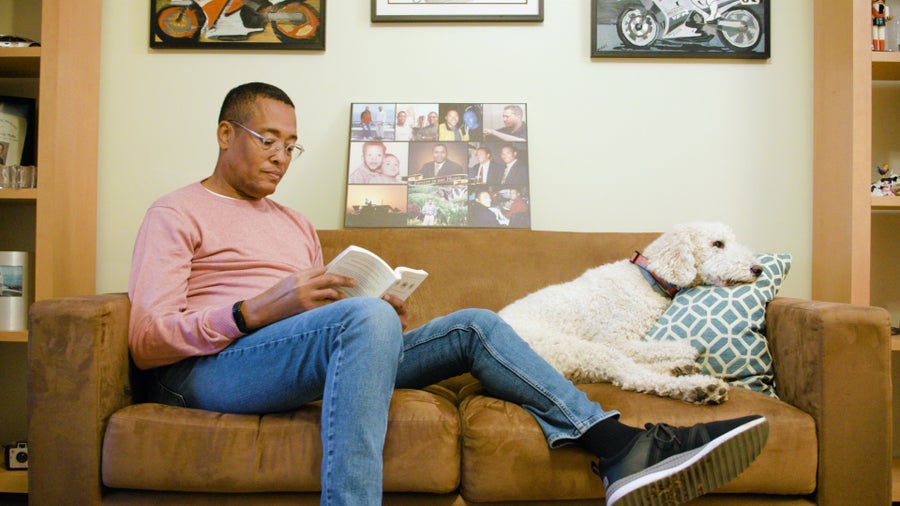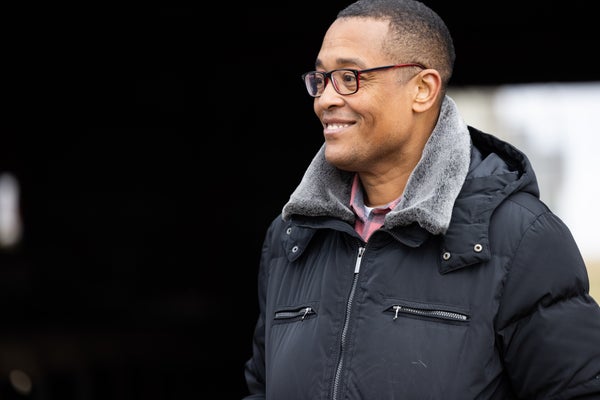Kevin Wake lay on the bathroom floor of his Chicago apartment, immobile and unable to speak. The first responders arrived. As he listened, silent and helpless, Wake heard the care team diagnose the cause of his condition as an alcohol or drug overdose.
But they were wrong, and he knew his life depended on communicating that.
At the hospital, Wake fought desperately to be heard. After catching the attention of a nurse, he gathered enough strength to scribble three words on paper: "sickle cell stroke.” The nurse presented Wake’s note to the attending physician, who finally understood the true extent of his condition.
It was a simple act that would end up saving his life.
Wake, now 56, is the sole survivor of three brothers born with sickle cell disease. Each day is a struggle, as he battles both the debilitating effects of a disease that affects mostly Black and African American people and the prejudice that often accompanies it.
Like other people with SCD, whom he calls sickle cell warriors, Wake has red blood cells that are misshapen (or sickled) and rigid, unlike healthy red blood cells, which are soft and flexible. The sickled cells make it harder for blood to flow through the body, and can block blood flow to the tissues, causing episodes called vaso-occlusive crises, which can strike at any time and anywhere.
“It’s a distinct and almost indescribable pain,” Wake says. Left untreated, such crises can cause severe and even life- threatening complications, organ damage, blockages in the lungs called acute chest syndrome, and acute strokes.
And Wake was not alone in having his symptoms misunderstood.
“Unfortunately that’s the kind of care that so many sickle cell warriors are faced with,” he says. “They’re not believed when they are in pain. It’s not believed they have sickle cell.”

Wake uses this room, created in honor of his brother, to meditate and reflect when he's having a difficult day.
Courtesy of Vertex Pharmaceuticals
Wake was treated effectively for his sickle cell stroke, but the incident still frustrates and angers him. He believes that getting proper care earlier in the episode could have changed the outcome and the severity of the symptoms he now suffers as a consequence. And he has no doubt about what was ultimately responsible for his poor experience with the healthcare system: racial prejudice.
“It felt like a losing battle,” he says. “I was seen one way and that’s how I was treated. There wasn’t a second thought that something else could be going on. They can see the color of your skin, but they can’t see sickle cell.”
Wake’s experience is one reason why he now serves as president of the Uriel E. Owens Sickle Cell Disease Association of the Midwest in Kansas City. He works directly with legislators and health-care providers to draw attention to the lack of awareness and education surrounding the disease.
These issues have affected Wake for his entire life. His mother had to leave her nursing job (and the healthcare it offered) to stay home and raise her sons with sickle cell disease. As his father was a farmer, the family had to buy their own health insurance, which meant significantly higher out-of-pocket costs.
“We would try to do whatever we could to survive without having to impact those insurance costs,” he said. Growing up on a remote farm in Kansas, they also had to travel for more than an hour any time he or one of his brothers needed care or experienced a sickle-cell crisis, adding to the time and productivity lost to the disease.
Later in life, Wake recalls the challenge of keeping stable employment to pay his bills. “I used to try to avoid going to the doctor because I just didn’t have the finances to pay for extra appointments,” he says. “I only treated my SCD when it was absolutely necessary, when I was in crisis.”
In his career, Wake felt under considerable pressure to overcompensate for his limitations, but this ultimately took a significant toll on his health. After working in the pharmaceutical industry for 23 years, overnight medical complications and a second stroke forced Wake into an early retirement on medical disability.
“That significantly impacted not only my income and my health insurance, but also it really affected me mentally and made me question what my purpose in life was,” he says. “I went through a two-year period of deep depression and anxiety, not knowing how to make ends meet.”
Wake knows he is not the only one. “I hear it from the community all too often. When a sickle cell warrior has to miss work due to their disease, they may lose pay or their job,” he says. “They can’t pay rent, or for their prescriptions or their groceries. We see a lot of patients who avoid getting care for their disease because of that.”
When Wake was young, his doctors told him he wouldn’t live past 25. Until he was in his 40s, he had never met anyone outside his family who lived with SCD, and he didn’t know there were other people like him and his brothers. Until then, he felt burdened with the weight of his disease—the stress of balancing school, part-time jobs and doctor’s appointments; the mental toll of managing the disease, and the belief that he needed to make the most of his potentially limited days.
After finally connecting with other people with SCD at a meeting of the organisation he now represents, Wake learned the skills he needed to look after himself. Now, he regularly sees a therapist, shares his story in support groups and benefits from music therapy.
“I always try to let people know that there are others out there going through this same thing,” he says.

